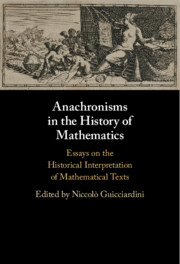 Anachronisms in the History of Mathematics
Anachronisms in the History of Mathematics Book contents
- Frontmatter
- Contents
- Contributors
- Figures
- Preface
- 1 Introduction: The historical interpretation of mathematical texts and the problem of anachronism
- 2 From reading rules to reading algorithms: textual anachronisms in the history of mathematics and their effects on interpretation
- 3 Anachronism and anachorism in the study of mathematics in India
- 4 On the need to re-examine the relationship between the mathematical sciences and philosophy in Greek antiquity
- 5 Productive anachronism: on mathematical reconstruction as a historiographical method
- 6 Anachronism in the Renaissance historiography of mathematics
- 7 Deceptive familiarity: differential equations in Leibniz and the Leibnizian school (1689–1736)
- 8 Euler and analysis: case studies and historiographical perspectives
- 9 Measuring past geometers: a history of non-metric projective anachronism
- 10 Anachronism: Bonola and non-Euclidean geometry
- 11 Anachronism and incommensurability:words, concepts, contexts, and intentions
- Index
8 - Euler and analysis: case studies and historiographical perspectives
Published online by Cambridge University Press: 19 July 2021
- Frontmatter
- Contents
- Contributors
- Figures
- Preface
- 1 Introduction: The historical interpretation of mathematical texts and the problem of anachronism
- 2 From reading rules to reading algorithms: textual anachronisms in the history of mathematics and their effects on interpretation
- 3 Anachronism and anachorism in the study of mathematics in India
- 4 On the need to re-examine the relationship between the mathematical sciences and philosophy in Greek antiquity
- 5 Productive anachronism: on mathematical reconstruction as a historiographical method
- 6 Anachronism in the Renaissance historiography of mathematics
- 7 Deceptive familiarity: differential equations in Leibniz and the Leibnizian school (1689–1736)
- 8 Euler and analysis: case studies and historiographical perspectives
- 9 Measuring past geometers: a history of non-metric projective anachronism
- 10 Anachronism: Bonola and non-Euclidean geometry
- 11 Anachronism and incommensurability:words, concepts, contexts, and intentions
- Index
Summary
Two parts of analysis to which Leonhard Euler contributed in the 1740s and 1750s are the calculus of variations and the theory of infinite series. Certain concepts from these subjects occupy a fundamental place in modern analysis, but do not appear in the work of either Euler or his contemporaries. In the case of variational calculus there is the concept of the invariance of the variational equations; in the case of infinite series there is the concept of summability. However, some modern mathematicians have suggested that early forms of these concepts are implicitly present in Euler’s writings. We examine Euler’s work in calculus of variations and infinite series and reflect on this work in relation to modern theories.
Keywords
- Type
- Chapter
- Information
- Anachronisms in the History of MathematicsEssays on the Historical Interpretation of Mathematical Texts, pp. 223 - 250Publisher: Cambridge University PressPrint publication year: 2021
- 1
- Cited by
